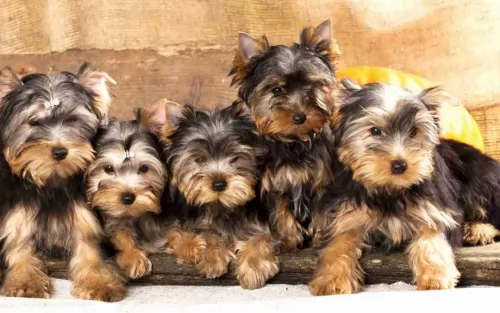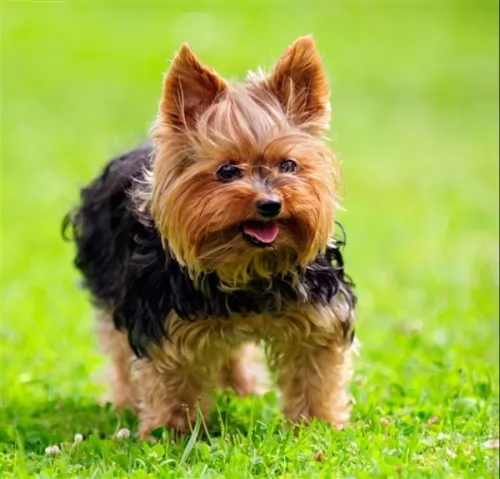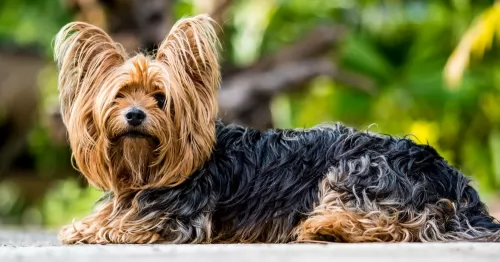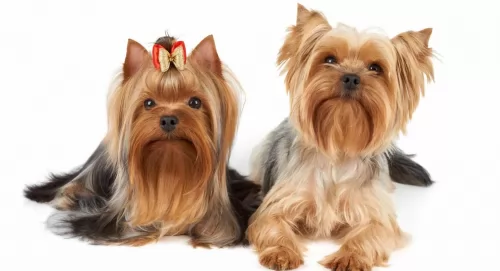 Petzlover
PetzloverYorkshire Terrier is originated from United Kingdom but Billy is originated from France. Yorkshire Terrier may grow 45 cm / 17 inches shorter than Billy. Yorkshire Terrier may weigh 29 kg / 63 pounds lesser than Billy. Both Yorkshire Terrier and Billy has same life span. Both Yorkshire Terrier and Billy has almost same litter size. Yorkshire Terrier requires High Maintenance. But Billy requires Moderate Maintenance
 The Yorkshire terrier originated in Yorkshire which is a place in northern England. In mid 19th century workers from Scotland came to Yorkshire in search for work. They brought different varieties of small terriers with them. Earlier they are known as Broken Haired Scotch Terrier and then Toy Terrier. In 1874 they were officially named as Yorkshire Terrier. They begun their journey as hunting dogs and later developed as companion dogs. AKC registered the breed in 1878.
The Yorkshire terrier originated in Yorkshire which is a place in northern England. In mid 19th century workers from Scotland came to Yorkshire in search for work. They brought different varieties of small terriers with them. Earlier they are known as Broken Haired Scotch Terrier and then Toy Terrier. In 1874 they were officially named as Yorkshire Terrier. They begun their journey as hunting dogs and later developed as companion dogs. AKC registered the breed in 1878.
The Billy (or Billie) Dog is a rare breed developed in France and mostly still only found in France. Created in the 19th century by Monsieur Gaston Hublot de Rivault and named after his home, Chateau de Billy, he is hunting dog of high quality. The Billy dog was developed by crossing the Poitevin’s original three lines – the Larrye, the Ceris and the Montemboeuf. In developing the Billy, Rivault favored the colors found in the Ceris and Montemboeuf strains as opposed to the tricolors of the Larrye strain. The Billy is a scent hound from all the lines leading back to the monks of the Saint Hubert Monastery in the middle ages, in Belgium, then refined in Gaul (France). The Billy line was considered the most elegant French breed and they were the last breed to come from that large scent hound type that the French nobility and royalty loved to breed.
In 1886 the Federation Cynoloquique Internationale established the standard for the Billy breed. The breed was a great hunter with resilience, speed, scenting and fortitude. The Billy hunted in large packs in pursuit of Wild Boar and Roe Deer. This was accomplished by the crossing of great hunters developed for their specific skills. The Ceris was amazing in its skill to hunt down wolves and hares. The Montemboeuf was a large, elegant dog that hunted wild boar and Larrye for his strong scent ability. Since these three breeds were true French breeds, the Billy was a true aristocratic scent hound in a pure scent hound line.
This gregarious, handsome dog became extremely popular in France in the 19th century. Unfortunately, the World Wars of the 20th century would take their toll on this rare breed and they were almost extinct by the late 1900’. There were only two hounds left by the end of the Second World War. Anthony Rivault, the son of Gaston, set about saving the breed by incorporating the lines of Harrier, the Poilevin and the Porcelaine with the two remaining hounds. From there the breed has been revived and is no longer on the verge of extinction. They are still rare and certainly not “popular”, but they are excellent hunters, especially hunting in packs. Today they are considered one of the breeds used to develop the Grand Anglo-Francais Blanc et Orange in France and there are several packs that hunt roe deer in France, while a couple packs are used to hunt wild boar.
 Yorkshire terriers are one of the glamorous member of the dog breeds. They have excellent personality as their owner will be surely proud of them when taking them in public. They like to go outside and make adventures. They are good companion dogs and watch dogs too. They are very affectionate with their owners. Yorkies always bark when any stranger comes and they should be taught about neighbours and when to bark. They will get angry on seeing new dogs and surely chases squirrels.
Yorkshire terriers are one of the glamorous member of the dog breeds. They have excellent personality as their owner will be surely proud of them when taking them in public. They like to go outside and make adventures. They are good companion dogs and watch dogs too. They are very affectionate with their owners. Yorkies always bark when any stranger comes and they should be taught about neighbours and when to bark. They will get angry on seeing new dogs and surely chases squirrels.
They like to spend more time with their people. Leaving them alone for long time is not good. Yorkshire terrier should be treated gently and with love. They love to spend time with older children. They love apartment life if they are made to play and walk daily. Yorkies are the second most popular dog in America.
The Billy dog is powerful, beautiful and built extremely well. He is large but he should also be light weight and lean. He has an athletic look, powerful muscles, and strong bones. He has floppy ears, dark eyes with dark rims and a white coat. This breed has a medium size head with a domed forehead and square muzzle. The ears are high on the head, flat and floppy while the neck is long and strong. Shoulders are also long and the back broad, the thighs muscular and the feet round. He has a long fluffy tail. The coat is short and can be seen through to the skin. He has white skin with brown spots and the fur is white or off white. The females are smaller than the males. He is a great family companion as well as a hunter. They have high pitched voices and they can be howlers. They have a strong prey drive and are great hunters. They can be great companion dogs for any family, just watch them with small children and small animals. They are big enough to need a lot of space and a lot of exercise. Scent hounds can be stubborn, and that trait is not lost on the Billy dog.
 Yorkshire terrier are not so much friendly with children. It is not advised to leave them with children without adult supervision.
Yorkshire terrier are not so much friendly with children. It is not advised to leave them with children without adult supervision.
They were previously used to catch rats and hunt badger and fox. They are excellent watchdogs and defend their territory very well.
They adapts well for apartment living. But they will not be happy if leaved alone for a long time. Yorkies cannot tolerate too hot or cold weather.
They are moderately easy to train. Yorkshire terrier should be trained early when they are amenable to process. Sessions should be conducted with lots of treats and must be short as they will easily get bored.
Even though the Billy Breed is very rare and faced potential extinction it is a terrific sporting dog who loves children, other dogs, and adults. He could be a good family dog if his exercise needs are met. He is social, gregarious, and gentle with people. They are happiest in a pack and do not do well in a one dog household. They form extremely strong bonds with their people and household. They are friendly and outgoing. This makes them a poor choice for guard dog. They have an exceptionally well-developed prey drive do they might be aggressive toward any animal smaller than them. This includes the family cat, other smaller dogs, hamsters etc.
Despite their history of almost becoming extinct the Billy dog is a hearty and healthy group. They do tend to get Bronchitis and colds due to the short, thin coat. Keep them indoors during winter. Another area of concern is the ears. They are prone to ear infections so keep their ears clean. They should not be exposed to cold weather. The Billy life expectancy is 10-14 years which is very good for such a large dog.
 For English bull dog puppies, When you change the puppy food from liquid to solid initially you must give what the dam is having. This is to avoid digestive problems when new food is introduced. The level of liquid food should be reduced in a step by step manner and thus increasing solid food gradually.
For English bull dog puppies, When you change the puppy food from liquid to solid initially you must give what the dam is having. This is to avoid digestive problems when new food is introduced. The level of liquid food should be reduced in a step by step manner and thus increasing solid food gradually.
You have two choices and one is manufactured dog food and another is home cooked food. Commercial brands are not suggested as they contain artificial coloring and chemical preservatives.
Vaccinations should be made at the right time. The food given should be the best.
Yorkshire terrier should be taught tricks by giving rewards. Exercising them has benefits such as maintaining muscles, release pent-up energy, good for heart, good metabolism, good sleep and be active.
The Billy dog is large, muscular and lean. Do not overfeed him, but you can safely free feed. Watch to be sure he does not gain too much weight and if he does go to two feedings per day.
As previously mentioned this is a healthy, long-lived dog. Watch for ear infections and keep him out of extreme cold.
This is a very athletic, active hunter, who needs a lot of exercise. Daily walks are good, but he needs 45 to 60 minutes of exercise every day. Remember he was bred to hunt and loves to do so. Find activities that let him use his athletic skills and strong sense of smell. He needs a big yard to romp in. He will excel at obedience, barn hunt and agility. A lure game might be good also, but he would be happier with a scent oriented “find it” game.